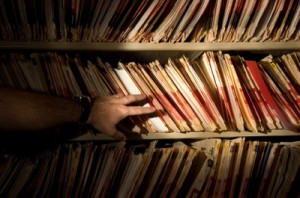 Our privacy rights have been under siege for a while and, with the passage of the Stimulus Bill, the nanny-state government has taken a huge leap forward in its quest to control all medical information once held in the confines of the doctor-patient relationship. This major attack by big government on medical privacy is now being followed with targeted attacks by the local brigades of law enforcement to gain access to our medicine cabinets.
Our privacy rights have been under siege for a while and, with the passage of the Stimulus Bill, the nanny-state government has taken a huge leap forward in its quest to control all medical information once held in the confines of the doctor-patient relationship. This major attack by big government on medical privacy is now being followed with targeted attacks by the local brigades of law enforcement to gain access to our medicine cabinets.
The sheriff departments of North Carolina grabbed headlines recently with their initiative to gain access to the state’s database of people who are prescribed prescription pain medicine and other controlled substances. While the controversy swirls around the issue of its effectiveness in actually helping law enforcement reduce crimes associated with drug abuse and trafficking, the larger, more insidious issue is the covert expansion of government’s control of medical information.
Americans are being told that mandated electronic medical records and access to prescription data bases are technological techniques to lower costs, improve healthcare quality, reduce misdiagnosis and, in the case of the North Carolina sheriffs, to reduce crime. What they aren’t being told is that these efforts will lead to fishing expeditions by federal and local agencies to categorize individuals by the condition of their heath and their propensity to abuse prescription drugs.
Should the sheriffs succeed, there will be over 2.5 million North Carolina residents under their watchful eye while undergoing common and, sometimes embarrassing treatments. Law enforcement officials are not immune to corruption, leaks or errors that could expand the number of eyes that see the data. In addition, it may be just a matter of time before the database is centralized with the federal government’s national “war on drugs”.
While the government’s EMR initiative is purported to be volunteer, there is no stated provision for opting out. In the end, when the health care insurance providers are centralized into a national exchange under the purview of the federal government, there is no limit to the number of ways it can use the information for or against individuals. It’s little known provision in the bill that your EMR will contain an “obesity rating”. We already know about the government’s plan to rank individuals by their various health conditions in order to “more efficiently” dispense healthcare (otherwise known as rationing).
So, where does this leave those people who value their right to privacy and who, if given the option (which is not available in these cases) would opt out of a centralized medical database? Certainly, those who have medical conditions or have had treatments which, if revealed, would be subjected to embarrassment or shame would avoid seeking further treatment. Even those needing typical medical care may be more hesitant to seek treatment. Many of these people will begin to find ways to jump off the health care grid, while some may not be able to do so.
For people who have been contemplating living life off the grid, the time to step up their self-reliant medical care is fast approaching, if not already here. Alternative or private medical sources may not be an available solution, so a plan to institute preventative and self-reliant health care is essential. At its core, the plan should include a three-pronged approach: 1) preventative medicine 2) skill and knowledge development 3) equip and supply
The best preventative medicine is to continuously work towards health optimization. A regimented, rigorous exercise program, combined with a disciplined, healthy eating plan has been medically proven to reduce incidences of heart disease, cancer, diabetes, immune deficiency, memory loss, and typical ailments. It is important to focus on strength building as much as cardio. The body also needs key supplements such as fish oil and glucosamine that may not be available in a daily meal plan.
Medical skills and knowledge can be obtained through a number of sources; however, true self-reliant medicine is best learned through first aid and natural medicine courses. By developing a continuous learning track that might begin with beginning first aid and elevating your learning to increasingly advanced courses, you can systematically acquire and retain more medical self reliance.
Finally, a well-equipped and supplied home can replicate most of what a typical emergency room has for performing most rudimentary procedures. Everything from industrial first aid and trauma kits, to blood pressure monitors, self-diagnosis kits, and even suture kits can form the basis of a self-doctoring exam room. Supplies such as bandages, splints, peroxide, and essential topical applications are always available but should be stockpiled as an emergency preparedness measure.
Our medical data represents the last bastion of privacy, seemingly protected by laws and professional privilege that the government intends to control. Although the vast majority of Americans oppose government intrusion in our private lives, the invasion will continue until an unknowing or disbelieving public sees the truth. Until then, if you want to keep your obesity rating to yourself, it’s time for some medical self reliance.
If you liked this article you may be interested in this product from our sponsor.
 [1]
[1]